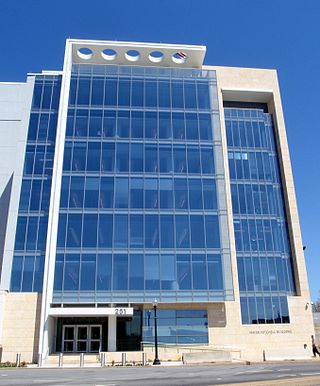Related Research Articles

The Republican Party, retroactively called the Democratic-Republican Party, and also referred to as the Jeffersonian Republican Party among other names, was an American political party founded by Thomas Jefferson and James Madison in the early 1790s that championed liberalism, republicanism, individual liberty, equal rights, decentralization, free markets, free trade, agrarianism, and sympathy with the French Revolution. The party became increasingly dominant after the 1800 elections as the opposing Federalist Party collapsed.

The People's Party, also known as the Populist Party or simply the Populists, was an agrarian populist political party in the United States in the late 19th century. The Populist Party emerged in the early 1890s as an important force in the Southern and Western United States, but collapsed after it nominated Democrat William Jennings Bryan in the 1896 United States presidential election. A rump faction of the party continued to operate into the first decade of the 20th century, but never matched the popularity of the party in the early 1890s.
The American Israel Public Affairs Committee is a lobbying group that advocates pro-Israel policies to the legislative and executive branches of the United States. One of several pro-Israel lobbying organizations in the United States, AIPAC states that it has over 100,000 members, 17 regional offices, and "a vast pool of donors". The organization has been called one of the most powerful lobbying groups in the United States.
The Project for the New American Century (PNAC) was a neoconservative think tank based in Washington, D.C., that focused on United States foreign policy. It was established as a non-profit educational organization in 1997, and founded by William Kristol and Robert Kagan. PNAC's stated goal was "to promote American global leadership". The organization stated that "American leadership is good both for America and for the world", and sought to build support for "a Reaganite policy of military strength and moral clarity".

Richard Norman Perle is an American political advisor who served as the Assistant Secretary of Defense for Global Strategic Affairs under President Ronald Reagan. He began his political career as a senior staff member to Senator Henry "Scoop" Jackson on the Senate Armed Services Committee in the 1970s. He served on the Defense Policy Board Advisory Committee from 1987 to 2004 where he served as chairman from 2001 to 2003 under the Bush administration before resigning due to conflict of interests.

Social Democrats, USA (SDUSA) is a social-democratic organization established in 1972 as the successor of the Socialist Party of America (SPA). The SPA had stopped running independent presidential candidates and consequently the term "party" in its name had confused the public. Moreover, replacing the "socialist" label with "social democrats" was meant to disassociate the group from the Soviet Union.

Dov S. Zakheim is an American businessman, writer, and former official of the United States government. In the Reagan administration, he held various Department of Defense positions. In 2000, Zakheim was a member of "The Vulcans", a group of foreign policy advisors assisting George W. Bush's presidential campaign. From 2001 to 2004 he was Under Secretary of Defense (Comptroller) and Chief Financial Officer of the Department of Defense.

Eliot Asher Cohen is an American political scientist. He was a counselor in the United States Department of State under Condoleezza Rice from 2007 to 2009. In 2019, Cohen was named the 9th Dean of the Paul H. Nitze School of Advanced International Studies (SAIS) at Johns Hopkins University, succeeding Vali Nasr. Before his time as dean, he directed the Strategic Studies Program at SAIS. Cohen "is one of the few teachers in the American academy to treat military history as a serious field", according to international law scholar Ruth Wedgwood. Cohen is a contributing writer at The Atlantic. He is also, with Eric Edelman, a co-host of the Shield of the Republic podcast, published by The Bulwark.
An independent voter, often also called an unaffiliated voter or non-affiliated voter in the United States, is a voter who does not align themselves with a political party. An independent is variously defined as a voter who votes for candidates on issues rather than on the basis of a political ideology or partisanship; a voter who does not have long-standing loyalty to, or identification with, a political party; a voter who does not usually vote for the same political party from election to election; or a voter who self-describes as an independent.
The Committee for Accuracy in Middle East Reporting in America (CAMERA) is an American non-profit pro-Israel media-monitoring, research and membership organization. According to its website, CAMERA is "devoted to promoting accurate and balanced coverage of Israel and the Middle East." The group says it was founded in 1982 "to respond to The Washington Post's coverage of Israel's Lebanon incursion", and to respond to what it considers the media's "general anti-Israel bias".

The terms party conference, political convention, and party congress usually refer to a general meeting of a political party. The conference is attended by certain delegates who represent the party membership. In most political parties, the party conference is the highest decision-making body of the organization, tasked with electing or nominating the party's leaders or leadership bodies, deciding party policy, and setting the party's platform and agendas.

The Israel Lobby and U.S. Foreign Policy is a book by John Mearsheimer, Professor of Political Science at the University of Chicago, and Stephen Walt, Professor of International Relations at Harvard Kennedy School at Harvard University, published in late August 2007. It was a New York Times Best Seller.
The Arab lobby in the United States is a collection of formal and informal groups and professional lobbyists in the United States paid directly by Gulf Arab states and private donors on behalf of the Arab states.

The Israel lobby are individuals and groups seeking to influence the United States government to better serve Israel's interests. The largest pro-Israel lobbying group is Christians United for Israel with over seven million members. The American Israel Public Affairs Committee (AIPAC) is a leading organization within the lobby, speaking on behalf of a coalition of pro-Israel American Jewish groups.
The Jewish lobby are individuals and groups predominantly in the Jewish diaspora that advocate for the interests of Jews and Jewish values. The lobby references the involvement and influence of Jews in politics and the political process, and includes organized groups such as the American Jewish Committee, the American Israel Public Affairs Committee, B'nai B'rith, and the Anti-Defamation League.

Richard Penn Kemble, commonly known as "Penn," was an American political activist and a founding member of Social Democrats, USA. He supported democracy and labor unions in the USA and internationally, and so was active in the civil rights movement, the labor movement, and the social-democratic opposition to communism. He founded organizations including Negotiations Now! and Frontlash, and he served as director of the Committee for Democracy in Central America. Kemble was appointed to various government boards and institutions throughout the 1990s, eventually becoming the Acting Director of the U.S. Information Agency under President Bill Clinton.
The American Palestine Committee was a political lobby group in the United States founded in 1932 to influence American policy towards the establishment of a Jewish national home in Palestine, an aim achieved in 1948 with U.S. support for the Partition of Palestine and subsequent recognition of the new state of Israel.
Advocacy groups, also known as lobby groups, interest groups, special interest groups, pressure groups, or public associations, use various forms of advocacy or lobbying to influence public opinion and ultimate public policy. They play an important role in the development of political and social systems.
The Coalition for a Democratic Majority (CDM) was a centrist faction, active in the 1970s within the Democratic Party of the United States.
Small organizations associated with the Socialist Party of America have served as schools for the leadership of social-movement organizations, including the civil rights movement and the sixties radicalism. These organizations are now chiefly remembered because of their members' leadership of large organizations that directly influenced the United States and international politics. After 1960, the party also functioned "as an educational organization" and "a caucus of policy advocates on the left wing of the Democratic Party".
References
- Brandon High. "The Recent Historiography of American Neoconservatism". The Historical Journal Vol. 52, No. 2 (Jun., 2009), pp. 475–491 JSTOR
- McQuaid, Kim. "The corporate counterattack: Fighting for the levers of power (II)." Antitrust L. & Econ. Rev. 17 (1985): 61.
- Reichley, A. James. "Religion and the future of American politics." Political Science Quarterly (1986): 23-47.
- ↑ Village Politics and the Mafia in Sicily Filippo Sabetti; McGill-Queen's Press - MQUP, Nov 14, 2002, (usage in Canada about Italian groups) pages 118, 172
- ↑ Department of Public Welfare: Hearing Before the Committee on Education and Labor, United States Senate, Sixty-Seventh Congress, First Session, on S. 408, a Bill to Establish a Department of Social Welfare United States. Congress. Senate. Committee on Education and Labor; U.S. Government Printing Office, 1921; page 42 "Does that cover the civic associations of Chicago, or is it just a letterhead organization?"
- ↑ Blackwood's Edinburgh Magazine, Volume 119 William Blackwood, 1876
- ↑ Passing of a patriot The Washington Times , October 22, 2005; by Ben Wattenberg
- ↑ The Road to Iraq: The Making of a Neoconservative War Muhammad Idrees Ahmad; Oxford University Press, Jun 30, 2014; page 95 "PNAC, a letterhead organisation operating out of the AEI offices"
- ↑ Christian Attitudes towards the State of Israel Paul Charles Merkley; McGill-Queen's Press - MQUP, Jun 14, 2001; page 180
- ↑ The Oxford Companion to American Law Kermit L. Hall, David S. Clark; Oxford University Press, May 2, 2002 ; page 24 "In 1928, AJS reorganized into what was essentially a letterhead organization, nominally headed by prominent figures ..."
- ↑ The Organic City: Urban Definition and Neighborhood Organization 1880--1920 Patricia Mooney Melvin; University Press of Kentucky, Feb 5, 2015; page 166 "By the beginning of the 1950s, it was no more than a letterhead organization."
- ↑ American Communism and Soviet Russia Theodore Draper; Transaction Publishers; page 175; "It was primarily a letterhead organization, and all five members of the committee were well-known Communists".